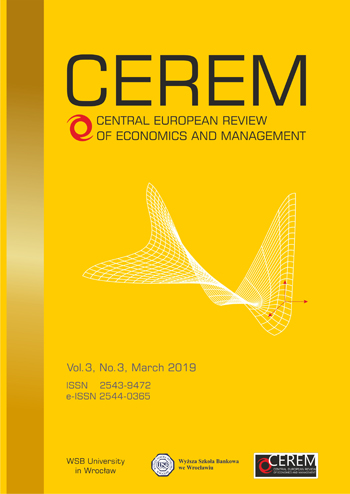The Seven Sustainability Competences according to the RESFIA+D Model
DOI:
https://doi.org/10.29015/cerem.781Słowa kluczowe:
Competences, Sustainable Development, RESFIA D, Human Resource Development (HRD), Professionals, Organizations, EducationAbstrakt
Aim:
The article describes the origins, structure and applications of a model for professional competences for sustainable development, called RESFIA+D. The model provides an assessment and policy instrument that can easily be applied practically.
Companies, NGO’s and other organizations may apply RESFIA+D as a structured tool for human resource development (HRD). Institutions for higher and vocational education can use the instrument for education (re)development, where curricula and didactic approaches are derived from a systematically designed competence profile in which sustainable development is integrated. Finally, individual professionals may use RESFIA+D as a tool for professional development.
Design / Research methods:
The article defines the concepts of ‘competence’ and ‘competent professionals’, in an easily understandable style. Next, the structure of the RESFIA+D model is described. Scientific details, such as origins and validation, are described elsewhere; references are made to other sources.
The basic set of RESFIA+D competences is combined with a structure of seven competence levels, which allows users to express the assessment results on an ordinal scale. This scale enables users to design plans for systematic improvements, both at a strategic and an operational level.
Conclusions / findings:
As illustrated in the article, RESFIA+D was applied successfully within companies, universities, and by individual professionals.
Originality, value of the article:
The article focuses in a unique way on the roles towards sustainability of individual professionals, whereas most or all usual assessment models focus on the roles of either entire organizations, or of individual persons seen as civilians or customers.
Bibliografia
Covey, S.R. (1989), The 7 Habits of Highly Effective People, Free Press, Simon & Schuster, New York.
Covey, S.R. (2004), The 8th Habit: From Effectiveness to Greatness, Free Press, Simon & Schuster, New York.
Deming, W.E. (1986), Out of the crisis, MIT Press, Cambridge.
INES (1995), INES Appeal to Engineers and Scientists, International Network of Engineers and Scientists for Global Responsibility, International Network of Engineers and Scientists for Global Responsibility (INES), Berlin.
IUCN, UNEP and WWF (1980), World Conservation Strategy: Living Resource Conservation for Sustainable Development, International Union for Conservation of Nature and Natural Resources with UNEP and WWF, Gland, Switzerland.
Kay, P., Berlin, B., Maffi, L., Merrifield, W. (1997), Color Naming Across Languages, in: Color Categories in Thought and Language, eds. Hardin, C.L. & Maffi, L., Cambridge University Press, Cambridge, pp. 21-56. Retrieved from http://wexler.free.fr/library/files/kay%20(0)%20color%20naming%20across%20languages.pdf.
KNMG (2003), Hippocratic Oath, Koninklijke Nederlandsche Maatschappij tot bevordering der Geneeskunst (KNMG) & Association of Universities in the Netherlands (VSNU), Utrecht.
Leary, T.F. (1957), The Interpersonal Diagnosis of Personality, Ronald Press Co, New York.
Maslow, A.H. (1954), Motivation and personality, Harper & Brothers, New York.
Van Nuland, Y., Broux, G., Crets, L., De Cleyn, W., Legrand, J., Majoor, G., Vleminckx, G. (1999), Excellent: A guide for the implementation of the EFQM-Excellence model, EFQM, Blanden, Belgium.
Pugwash (1995), Pugwash Declaration, Student Pugwash USA, Washington D.C.
Roorda, N. (2010), Sailing on the winds of change: The Odyssey to Sustainability of the Universities of Applied Science in the Netherlands, PhD dissertation, Maastricht University Press, Netherlands. To be retrieved from: https://www.box.net/shared/nz75typdk5.
Roorda, N. (2015), De Zeven Competenties van de Duurzame Professional (The seven competences of the sustainable professional), Garant, Antwerpen.
Roorda, N. (2016), The seven competences of a sustainable professional: The RESFIA+D model for HRM, education and training, in: Management for sustainable development, eds. Machado, C., Davim, J.P., River, Gistrup, Denmark, pp. 1-48.
Roorda, N. (2017), Fundamentals of Sustainable Development, 2nd edition, Routledge, London / New York.
Roorda, N. (2018), Future-Focused Entrepreneurship Assessment (FFEA®), in: Corporate social responsibility in management and engineering, eds. Machado, C., Davim, J.P., River, Gistrup, Denmark, pp. 31-98.
Roorda, N. (n.d.), Website. RESFIA+D: https://niko.roorda.nu/management-methods/resfia-d. FFEA: https://niko.roorda.nu/management-methods/ffea-assessment. The Pledge: https://niko.roorda.nu/pledge.
Roorda, N. & Rachelson, A. (2018), The seven competences of the sustainable professional: Developing best practices in a work setting, Routledge, London / New York.
Serageldin, I. (1996), Sustainability and the wealth of nations: First steps in an ongoing journey, Environmentally Sustainable Development Studies and Monograph Series 5, World Bank, Washington DC.
Tennant, G. (2001), SIX SIGMA: SPC and TQM in Manufacturing and Services, Gower Publishing, Aldershot, UK.
UN DESA (2015), Transforming our world: the 2030 agenda for sustainable development, A/RES/70/1, United Nations Department of Economic and Social Affairs (DESA), New York. Retrieved from https://sustainabledevelopment.un.org/content/documents/21252030%20Agenda%20for%20Sustainable%20Development%20web.pdf.
Vare, P. (2018), A Rounder Sense of Purpose: developing and assessing competences for educators of sustainable development, Form@re - Open Journal per la formazione in rete, ISSN 1825-7321, vol. 18, n. 2, pp. 164-173.
WCED (1987), Our Common Future. Report of the World Commission on Environment and Development; Also known as the Brundtland Report, Oxford University Press, New York. Available on http://www.un-documents.net/ocf-ov.htm.
Pobrania
Opublikowane
Numer
Dział
Licencja
Autor przenosi nieodpłatnie na Wyższą Szkołę Bankową we Wrocławiu , bez ograniczeń terytorialnych, majątkowe prawa autorskie do tego utworu w rozumieniu ustawy z dnia 4 lutego 1994 roku o prawie autorskim i prawach pokrewnych ( Dz.U. 1994, Nr 24, poz. 83 ze zm. )na zasadzie wyłączności, tj. prawo do:
a) wyłącznego używania i wykorzystania utworu w dowolnej działalności przez Wyższą Szkołę Bankową we Wrocławiu, w szczególności w działalność Biblioteki Cyfrowej uruchomionej przez Wyższą Szkołę Bankową we Wrocławiu
b) wytwarzania, utrwalania i zwielokrotniania egzemplarzy utworów wszelkimi technikami, w tym techniką drukarską, reprograficzną, zapisu magnetycznego oraz techniką cyfrową, w szczególności ich zwielokrotniania poprzez dokonywanie zapisów na płytach typu CD,
c) zamieszczenia wybranych fragmentów utworu w celach promocyjnych w publikacjach, materiałach promocyjnych, w sieci Internet oraz sieciach wewnętrznych typu Intranet Wyższej Szkoły Bankowej we Wrocławiu,
d) wprowadzania utworu do pamięci komputera Wyższej Szkoły Bankowej we Wrocławiu,
e) kopiowania i powielania utworu w technologiach fotomechanicznych lub innych znanych w dniu zawarcia umowy (fotokopie, kserokopie itp.),
f) przetworzenia dzieła na formę elektroniczną i nieograniczonego rozpowszechniania w sieci Internet.


